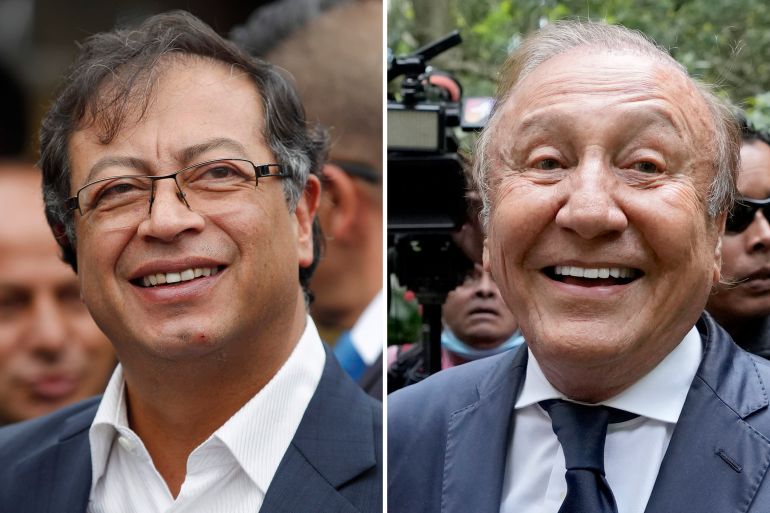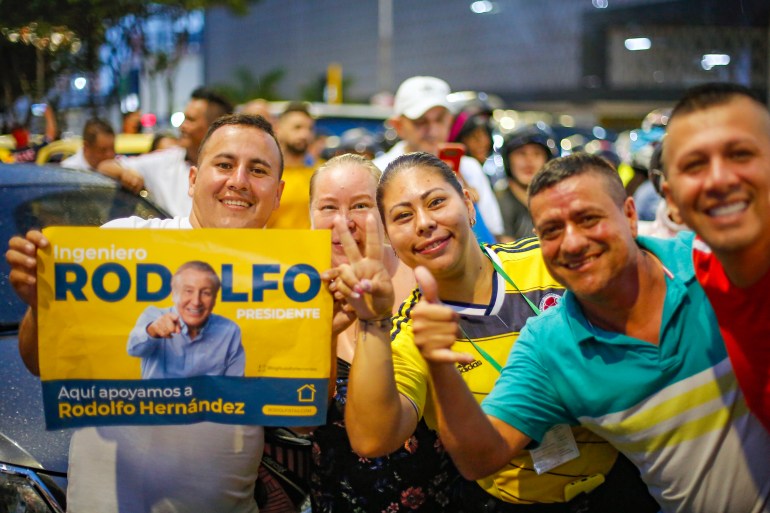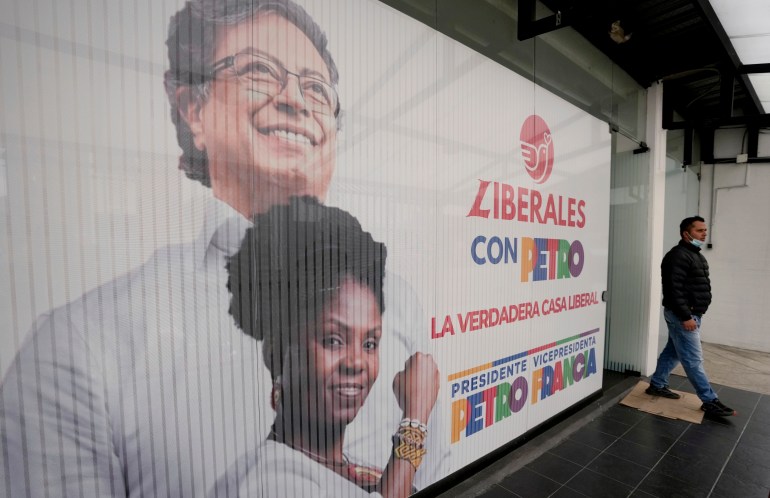Scandals, uncertainty hang over Colombia as election looms
Many voters remain undecided after campaign marked by death threats, scandals and preemptive fraud claims.

Bogota, Colombia – Just days before one of Colombia’s most consequential presidential elections in decades, the nation is on edge.
Hundreds of thousands of eligible voters are still unsure who they will cast their ballots for on Sunday, when left-wing former rebel group member Gustavo Petro takes on populist former mayor Rodolfo Hernandez.
Keep reading
list of 3 itemsFARC dissident leader killed in Colombian army operation: Duque
Colombia: Will elections further divide the country?
At Paloquemado central market in the capital Bogota, 42-year-old Maria Arboleda, who sells fruit and vegetables at her stall, was among those who remain on the fence.
Like a majority of Colombians, she said she wants change but is unsure about who could better provide it. Her main worries are rising inflation, finding a good job for her son, and growing crime in the city.
“I am intrigued by what Petro says but I am worried about voting for an ex-guerrilla. I like the fact that Rodolfo [Hernandez] is not a politician, but some of the things he says also worry me and I don’t know who he will govern with.”
The Colombian presidential runoff on June 19 comes after an election cycle marked by death threats against candidates, scandals and preemptive accusations of fraud. Both contenders are promising radical change from the status quo and are in a dead heat, according to recent polls.
A victory for Petro, a former rebel with the M-19 armed group, would represent a sharp left turn after decades of conservative rule, and the first time a left-wing leader would govern the country in its history.
For many, a win by Hernandez represents an even bigger jump into the void.
An unfiltered populist businessman, he is promising to “drain the swamp” of corrupt politicians, a pledge that brings to mind other successful political candidates like Donald Trump in the United States, Silvio Berlusconi in Italy, and Nayib Bukele in El Salvador.
Either one of them will inherit a deeply divided nation, steeped in discontent and desperately demanding change and reforms.
The strategies
The candidates changed their strategy in the weeks leading up to the runoff.
Hernandez, the self-declared king of Tik-Tok, has avoided traditional campaign events and focused on his quirky and successful online presence. He gathered 28 percent of the vote in the first round to finish in second – and simply not being Petro is expected to garner him a majority of conservative votes.
But besides repeating his slogan, “don’t steal, don’t lie, don’t betray”, like a mantra, he has largely kept out of sight in the final stretch of the campaign.

He avoided debates with Petro, instead putting forward his proposals on Twitter, at times even in contradiction with his electoral programme. And, instead of traditional interviews, he mostly relied on Facebook live.
But the short runoff campaign has become increasingly long for Hernandez. Polls show he has been losing part of his support as voters discovered more about him. He has been indicted on corruption charges, has repeatedly made sexist comments, and showed a lack of knowledge of how the government works.
Angel Beccassino, his main campaign strategist, said they were victims of continuous attacks from Petro’s camp.
“Petro’s campaign has focused on attacking Rodolfo,” Beccassino told Al Jazeera. “Our decision has been to continue with livestreamed conversations with different sectors of society instead of doing interviews or debates.”
Petro also changed his campaign. He abandoned the massive crowds and rallies that characterised earlier weeks in exchange for intimate visits to poor families, farmers and factory workers, especially in the regions where Hernandez won a majority of votes.
His campaign called it “micro-politics”.
“It is a much quieter campaign,” said Petro’s chief debate strategist, Alfonso Prada. “A campaign where Petro listens to the people very closely, talking to a fisherman, to a small businessman, an entrepreneur, to a miner in his mine – and through it, he transmits many messages to Colombia.”

‘A disservice to the electorate’
Sergio Guzman, a political analyst and director of Bogota-based Colombia Risk Analysis, said the runoff campaign took a “nasty” turn, as political discourse and public debate crumbled in favour of partisan attacks.
“Things just got nasty,” he told Al Jazeera. “There’s been an erosion of the public debate, there’s been an erosion of communications, and I think the media played an important role in this. Social media also played a big role in manipulation and disinformation, but all of them – the candidates included – are doing a disservice to the electorate.”
Last week, right-wing weekly Semana began publishing edited recordings of Petro’s campaign meetings. In the videos, his strategists discuss how to attack rivals and do damage control.
Hernandez was quick to describe the videos as evidence that Petro and the people around him are a criminal gang, while the left-wing leader’s campaign denounced the leak as nothing short of Watergate, referring to the 1970s spying scandal involving former US President Richard Nixon.
Petro called on Semana to publish the videos in their entirety and promised to end the campaign if any illegal activity was revealed.
“Nobody wants to see how the sausage is made, but once you see it you can’t unsee it,” Guzman said. “The problem is Petro has tried to brandish his character for a clean campaign, no fake news, no disinformation. And the videos suggest there is an underbelly to that.”
In such a hyper-charged atmosphere heading into Sunday’s vote, analysts have also questioned whether either candidate will call for a recount in the case of a very close result.
Petro’s campaign, in particular, has insisted on the risk of electoral fraud, saying that Colombian electoral authorities have not been neutral in the race. And any hint of wrongdoing could easily spark a return of street protests.